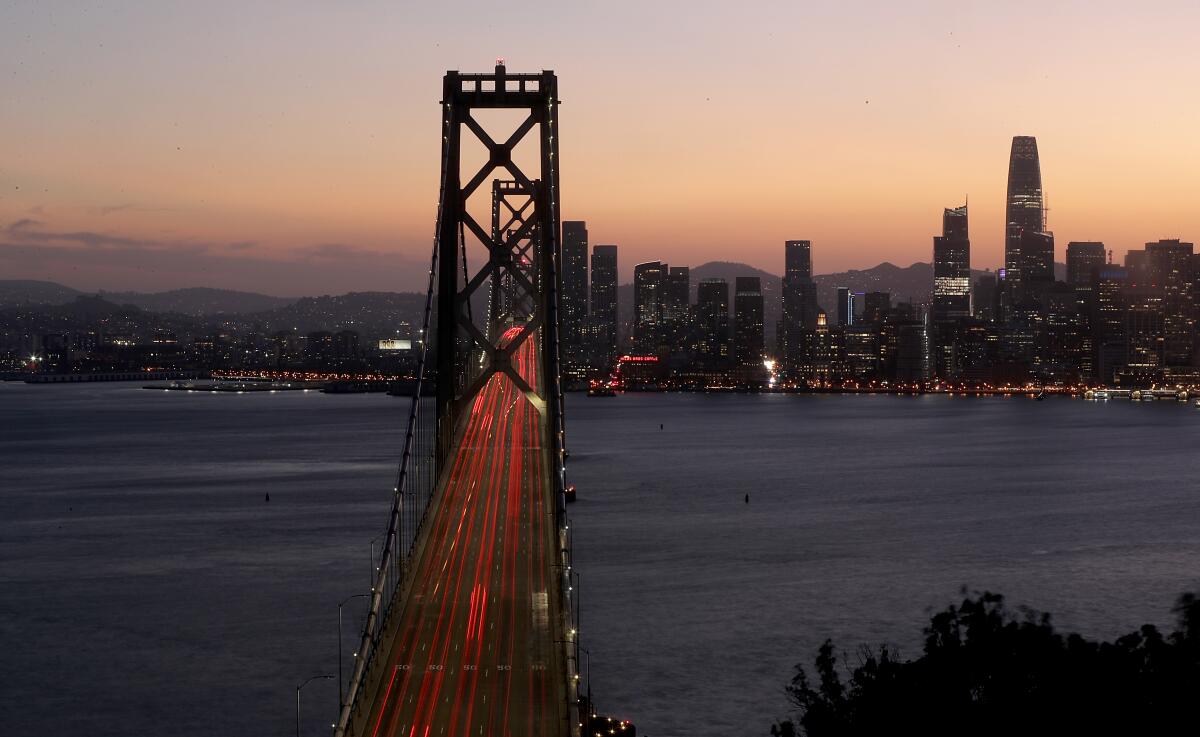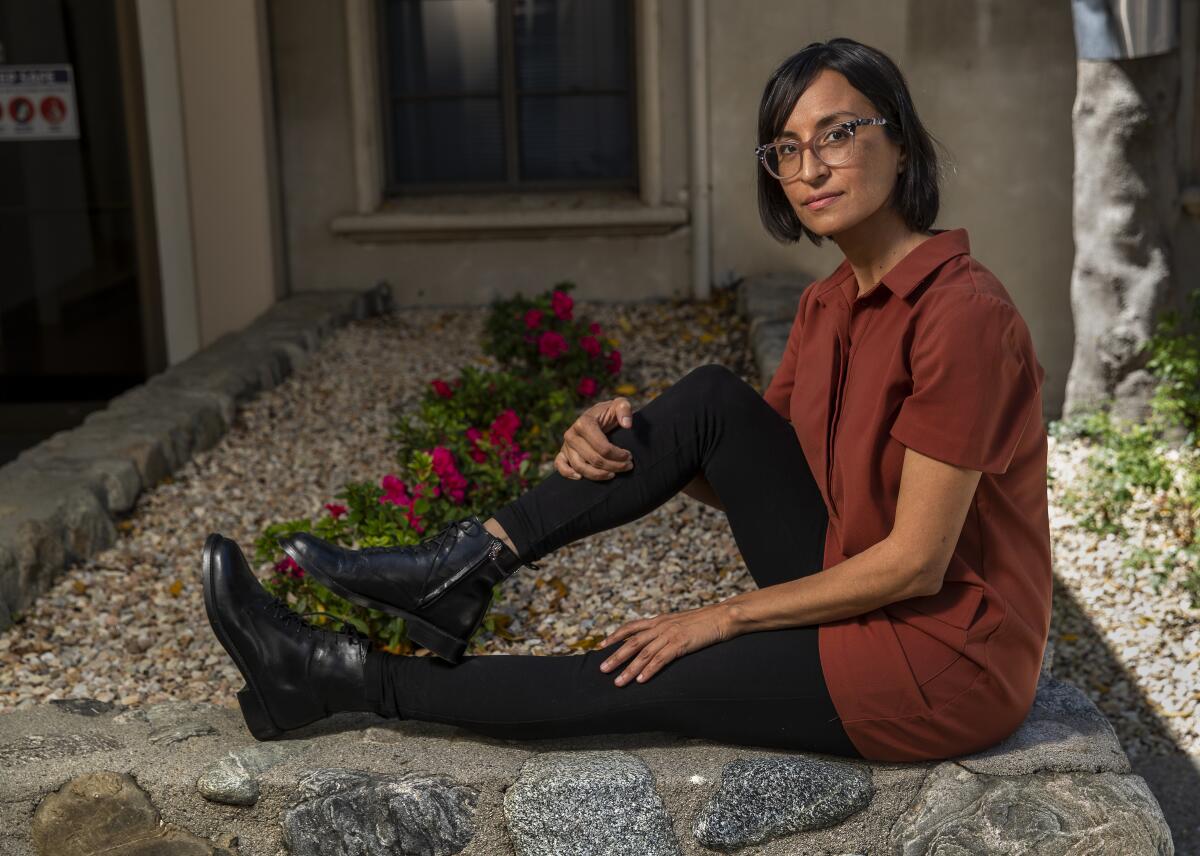Essential California: What’s going on with San Francisco’s schools?

- Share via
Good morning, and welcome to the Essential California newsletter. It’s Tuesday, April 6, and I’m writing from Los Angeles.
Sign up for Essential California
The most important California stories and recommendations in your inbox every morning.
You may occasionally receive promotional content from the Los Angeles Times.
Just a little over two months ago, the San Francisco Board of Education voted to rename nearly a third of the district’s schools because of alleged associations with slaveholding, colonization or oppression.
The decision to strip more than 40 schools — including Dianne Feinstein Elementary School and Abraham Lincoln High School — of their names while those campuses remained closed ignited far-reaching controversy and legal challenges.
Now, the board is set to reverse course on its extremely contentious decision. On Tuesday afternoon, the board will vote on a resolution at its afternoon meeting that would officially suspend renaming efforts until students are back in school full time.
[Read the story: “San Francisco expected to reverse decision on renaming public schools” in the Los Angeles Times]
As my colleagues Faith E. Pinho and Maura Dolan report, the school renaming controversy has roiled San Francisco politics, distracting local leaders from the pandemic, angering parents eager for schools to reopen and sparking bitter battles among members of the school board, who face a potential recall by voters. On Monday, the district’s superintendent Dr. Vincent Matthews announced that he was postponing his planned departure by at least a year as the district navigates through multiple crises.
San Francisco’s incendiary education debate and its ensuing controversies have become something of a national spectacle, exacerbated by an astonishing amount of infighting among local officials. Within the last few months, the San Francisco Unified School District Board of Education has been sued by the city of San Francisco and a member of its own school board, among other legal challenges.
Here’s a quick look at the many issues facing San Francisco’s embattled school district, and how they unfolded over the past few months.
The main issue has, of course, been the question of reopening. San Francisco public school classrooms have been closed for more than a year while most private schools have been meeting in person for months. The reopening debate has played out against a landscape of racial reckoning, as other escalating and interconnected controversies dogged the district.
Though the process had been in the works for months, the school renamings issue didn’t combust into a full-fledged national controversy until late January, when the board formally voted to change the names of the schools. Outrage over the district putting time and resources toward the effort amid the pandemic was compounded by anger over its seemingly shoddy research process. (A spreadsheet documenting the renaming committee’s work was riddled with factual errors and relied heavily on frequent Wikipedia citations.)
Not long after the renaming decision was made, the city of San Francisco took the extraordinary step of suing its own school district and board of education to try to force the reopening of public schools for in-person learning. Mayor London Breed said the failure of schools to come up with an adequate reopening plan while devoting resources to name changes had been “infuriating” and the city filed the lawsuit because they were “out of options.”
As my San Francisco colleague Maura Dolan reported, the lawsuit came after Breed had publicly chastised local education leaders for months about keeping public schools closed while private ones had reopened.
In early February, the board once again courted controversy when it chose to fast-track a decision to end performance-based admissions at the district’s academically prestigious Lowell High School. The board characterized the move as an urgent matter of racial justice, and there are plenty of arguments to be made about who is served when the demographic makeup of one of the district’s most elite schools looks so unlike the the rest of the district. But the decision also exacerbated the ire of parents and officials who felt the board’s focus should have been devoted to reopening schools, and brought the threat of more litigation.
The board’s political problems were turbocharged in late February, when two parents launched a recall effort to remove three members from the school board. The couple spearheading the recall effort work in tech and moved to the Bay Area “not long ago,” according to the Chronicle.
A new controversy erupted in March, when a four-year-old Twitter thread from the school board’s vice president Alison Collins, then a private citizen, resurfaced. In writing about the anti-Black racism that she and her daughter had experienced in school settings, Collins broadly attacked Asian Americans, deploying racist tropes and writing that Asian Americans “use white supremacist thinking to assimilate and ‘get ahead.’ ”
As The Times’ editorial board writes, Collins’ “concerns about standing up against racism were legitimate, but her remarks about Asians were heinous, invoking racist tropes and nasty accusations against a racial group that makes up 30% of the school district’s enrollment.”
[See also: “The strange and terrible saga of Alison Collins and her ill-fated Tweets” from Mission Local]
Virtually all of San Francisco’s political establishment called for her resignation. Collins remains on the board, but two weeks ago her fellow school board members voted to strip her of her committee assignments and role as vice president. Last week, Collins filed an $87-million lawsuit against the district and all but one of her fellow members, contending that removing her title and committee assignments violated her free speech and due process rights.
“It is just a mess, and it is embarrassing and it’s disgraceful,” Breed told reporters when asked about the dispute at a news conference last week.
The district is set to begin welcoming elementary and some high-needs students back to classrooms this month, but the Chronicle reports that the district still lacks a comprehensive plan to reopen middle and high schools.
And now, here’s what’s happening across California:
California nears a COVID-19 vaccine target that would ease more reopening rules: California is on the precipice of administering 4 million COVID-19 vaccine doses in its most disadvantaged areas — a hurdle that, when cleared, would trigger a rewrite of the state’s reopening blueprint to make it easier for counties to more widely reopen businesses and other public spaces. Los Angeles Times
Note: Some of the sites we link to may limit the number of stories you can access without subscribing.
L.A. STORIES
Carribean Fragoza lives the life she writes — busy, creative and slightly surreal. Fragoza, who was raised in South El Monte and currently lives in Fresno, released her debut story collection earlier this year. Los Angeles Times

The L.A. Stage Alliance announced that it is immediately ceasing all operations after mistakes in the group’s Ovation Awards show — including the misidentification of an Asian American nominee — led dozens of theaters to revoke their membership. Los Angeles Times
Support our journalism
IMMIGRATION AND THE BORDER
The Long Beach Convention Center is poised to become the second temporary facility in California to hold migrant children who traveled to the southern U.S. border without their parents or legal guardians. Los Angeles Times
POLITICS AND GOVERNMENT
Vice President Kamala Harris gave a boost to the Biden administration’s $2-trillion infrastructure plan as well as to Gov. Gavin Newsom’s efforts to stave off a recall, joining Newsom in Oakland on Monday during her first official visit to California since taking office. Los Angeles Times
Will California Secretary of State Shirley Weber’s daughter fill her mother’s vacated Assembly seat? The special election primary to represent California’s 79th Assembly District is Tuesday. Amid a crowded field of candidates, Weber’s daughter Dr. Akilah Weber has far outpaced her opponents in fundraising. The primary is likely to be followed by a run-off election in June, unless one of the candidates gets the majority needed to win the seat outright. San Diego Union-Tribune
COPS, CRIME AND COURTS
Two Stockton police officers were fired for their “egregious” excessive use of force on a high school student. The Stockton teen and his family have filed a lawsuit against the city and four police officers, alleging police “viciously beat” the boy. Stockton Record
[See also: “‘I thought I was gonna die’: Teen recounts traumatic police beating as dozens gather for protest” in the Stockton Record]
CALIFORNIA CULTURE
“The client is buying the show and I’m bringing it to them like DoorDash.” One Bay Area concert promoter has pivoted to booking intimate backyard shows. Santa Rosa Press-Democrat
‘This is my home. I’m not going anywhere’: Victims of anti-Asian rhetoric meet in Orange County to show solidarity. The Daily Pilot
A poem to start your Tuesday: “Psalm” by Marilyn Nelson. The Writer’s Almanac
For the record: Dolores Huerta’s birthday is April 10, 1930, not April 10, 1939, as yesterday’s newsletter incorrectly stated.
Free online games
Get our free daily crossword puzzle, sudoku, word search and arcade games in our new game center at latimes.com/games.
CALIFORNIA ALMANAC
Los Angeles: perfectly fine, 72. San Diego: perfectly fine, 68. San Francisco: perfectly fine, 68. San Jose: perfectly fine, 57. Fresno: perfectly fine, 70. Sacramento: sunny, 79.
AND FINALLY
Today’s California memory comes from Lorraine Alkire:
It was time for a change, so I packed the car and headed west. My destination was an apartment my one friend in L.A. hooked me up with. I was told you could see the Hollywood sign from the window. I figured that meant from one window if you stood in just the right place, but I was game and it was the right price: $400/month. When I got there, it wasn’t just one window — I could see it from every window, even taking a shower. It was an old building near the corner of Hollywood and Edgemont. I was young, unemployed, terrified and hopeful, but looking out at the palm trees and across the rooftops to the Hollywood sign, I felt the first stirrings of love. And when you’re falling in love, none of that matters.
If you have a memory or story about the Golden State, share it with us. (Please keep your story to 100 words.)
Please let us know what we can do to make this newsletter more useful to you. Send comments, complaints, ideas and unrelated book recommendations to Julia Wick. Follow her on Twitter @Sherlyholmes.
Sign up for Essential California
The most important California stories and recommendations in your inbox every morning.
You may occasionally receive promotional content from the Los Angeles Times.




